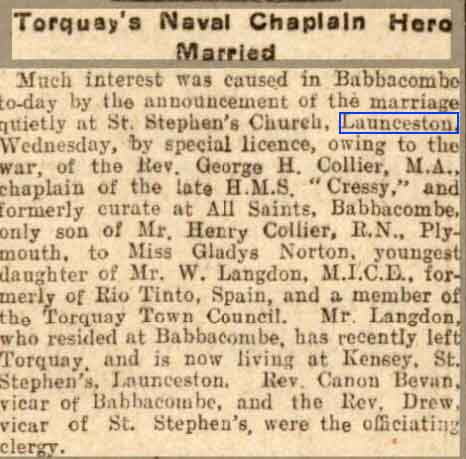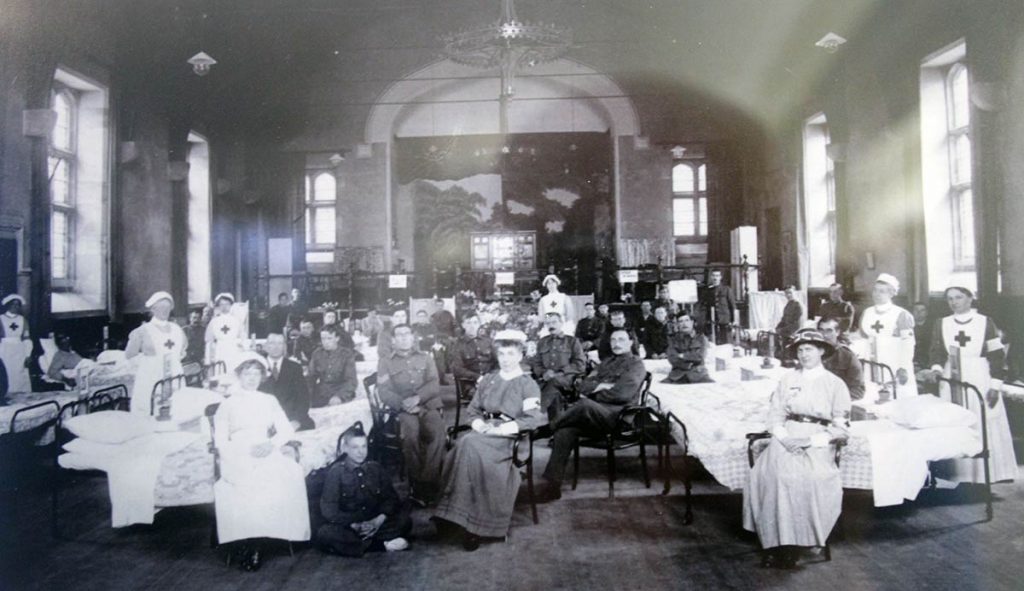.
1914
August

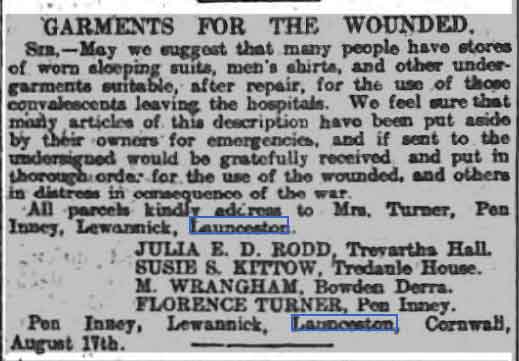

Exeter and Plymouth Gazette – Friday 21 August 1914
September


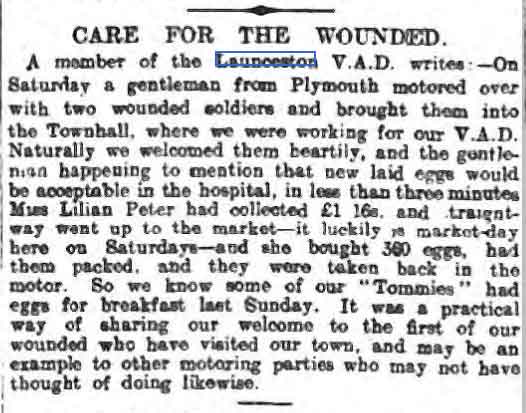
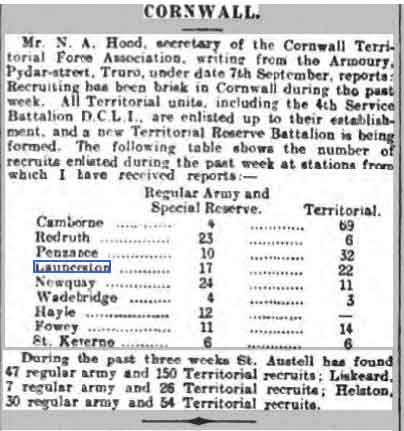
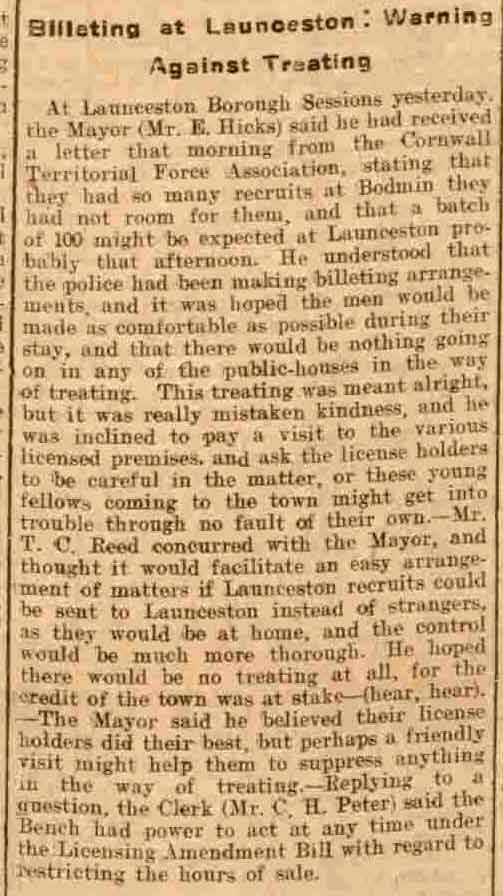
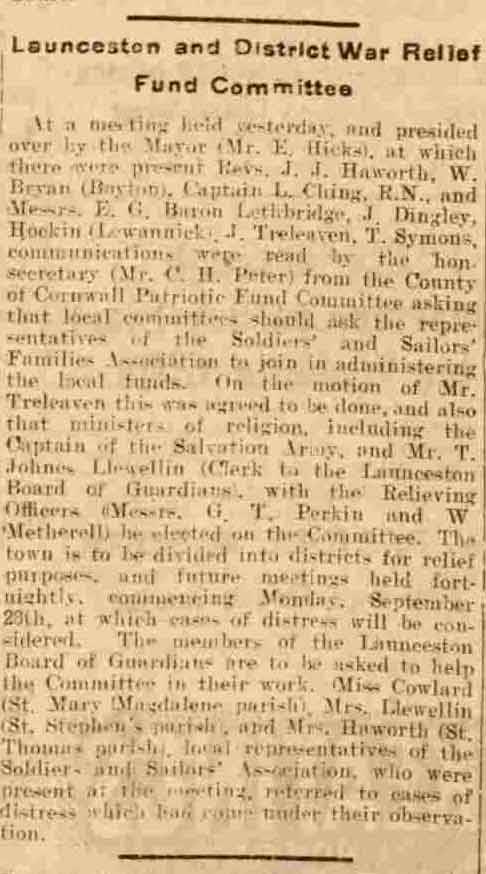
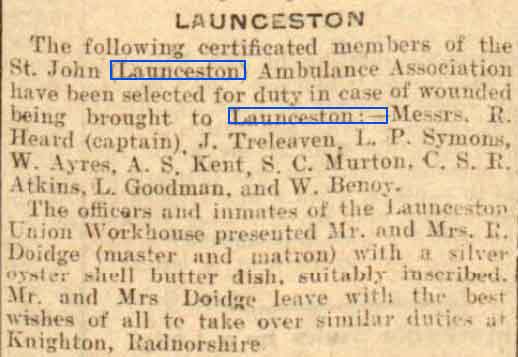
October
Western Times – Friday 02 October 1914
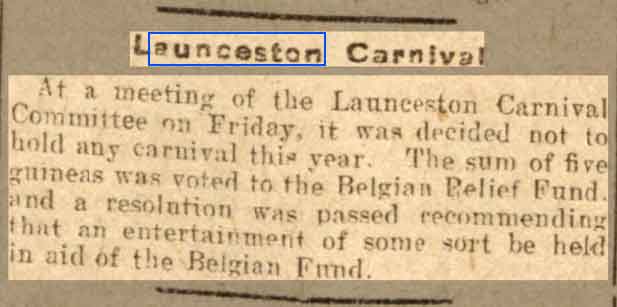
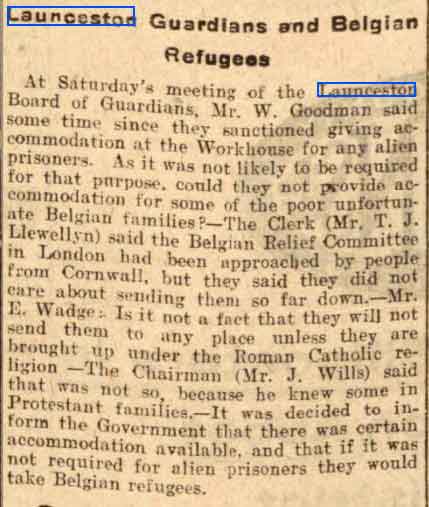
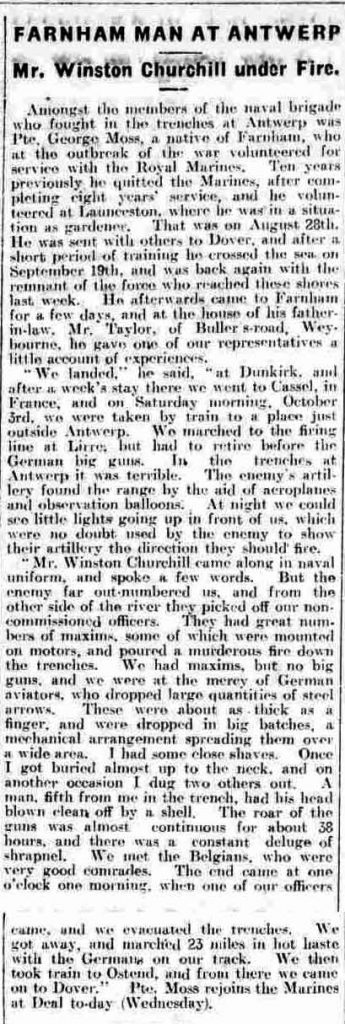


Post & News, October 20th, 1914: THE CHAPLAIN OF THE “CRESSY.”
Last week, Rev George H Collier, MA., and Curate, All Saints, Babbacombe, was married to Miss Langdon of Kensey, Launceston.
Mr. COLLIER’s EXPERIENCIES. How the Rev GH Collier escaped when the “Cressy” (one of the three cruisers recently torpedoed by German submarines in the North Sea) went down, is described as one of the wonders in all the history of the sea. As the cruiser sank, the crew picked up anything that could float, and then jumped overboard. The Chaplain could not swim and it was stated by an eye witness that he became unconscious when picked up. Mr Collier [says the Torbay News & Dartmouth Gazette] officiated on Sunday morning at the communion service at the All Saints Church, Babbacombe.
Although in a weak state of health after his long immersion he delivered a short address, in which he described his personal experiences, and expressed thank goodness for the preservation of his own life and the life of another parishioner – William Eales – one of the crew of the “Hague”.
Throughout the service Mr Collier was full of emotion, and his firm voice of a few weeks ago was now greatly changed. His singing, generally a feature of the musical portion of that service, told of what he had been through during his seven weeks absence from Babbacombe.
In the pulpit, Mr Collier said in a manner which brought tears to the eyes of many, he could not preach a sermon, and he was sure no one in the congregation expected one of him. His heart was full of thanksgiving to Almighty God for being saved. He wished to thank the congregation for their prayers on his behalf during the time that he had been absent from them.
It had been a great help to him in his spiritual work. He wished also to take that opportunity of thanking all his friends on behalf of the officers and men of his late ship, for sending him magazine and periodicals for the men to read; they all greatly appreciated them. He had hoped to be able to relate to them a few of his experiences of the past week, and to tell them about his work amongst the sailors, but he found he could not do so that morning, but hoped to tell them about it at the evening service. He was naturally very weak, and it was as much as he could do to take the service that morning, but he felt he wanted to be with them again. Continuing, he explained how he was aroused from his bed to assist the rescue from a sinking ship, but soon to find that his own ship had been torpedoed, and was rapidly going under. He was in the water for two hours and forty minutes when he lost consciousness, and it must have therefore quite three hours before he was rescued. He considered the preservation of his life to be an absolute miracle, especially as he could not swim. “I thought of the people of Babbacombe” he added, “who would be saying ‘Poor Mr Collier,’ but don’t say it. I am quite happy and eager to begin again.” Here Mr Collier was almost lost, and he left the pulpit saying with such feeling “God bless you all.”
It appears that Mr Collier, the ship’s doctor (Dr. Martin), Staff Surgeon Sawdy, and another man, clung to a lifebelt and a piece of wood after the Cressy went down. Mr Collier and the doctor being saved after having been in the water two hours and forty minutes. Mr Collier lost consciousness for a short time before he was rescued and he was unconscious for about three hours afterwards.
Mr Collier intended giving another short address at the evening service, but to the great disappointment of the crowded congregation, the Vicar (Canon Bevan) announced that he had received a message that Mr Collier had had a fainting fit, and that his doctor had forbidden him his attending church.
In a touching address, the Vicar recalled some of Mr Collier’s words at the morning service, and narrated a striking instance of self-sacrifice on the part of Mr Collier. A lad on board on whom the reverend gentleman had made an impression, and whom he had influenced to make his Communion, asked him, when the ship was going down, to give him his lifebelt, as he [the lad] could not swim. Mr Collier did so, although he himself was unable to swim. Soon afterwards the doctor of the ship brought Mr Collier another lifebelt, and it was by clinging to this that his life was saved. The Vicar added that he believed that on account of this act of self-sacrifice God had spared Mr Collier’s life for another service.
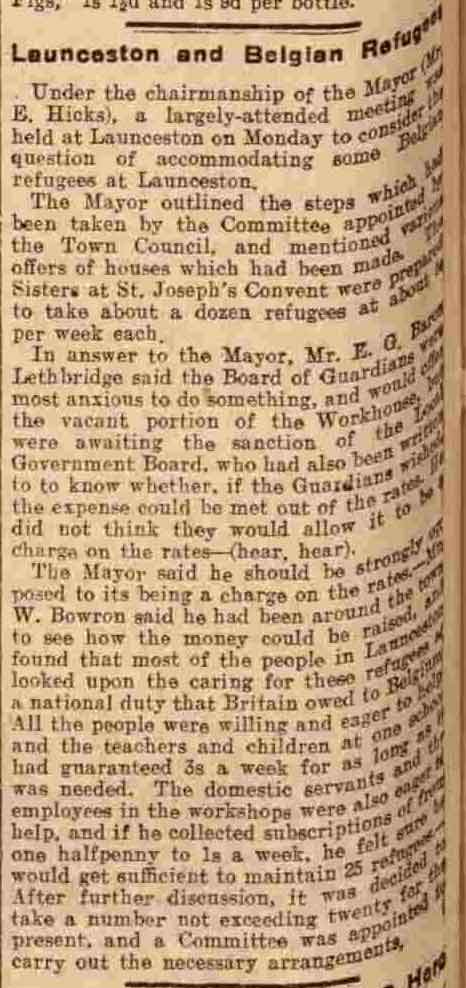
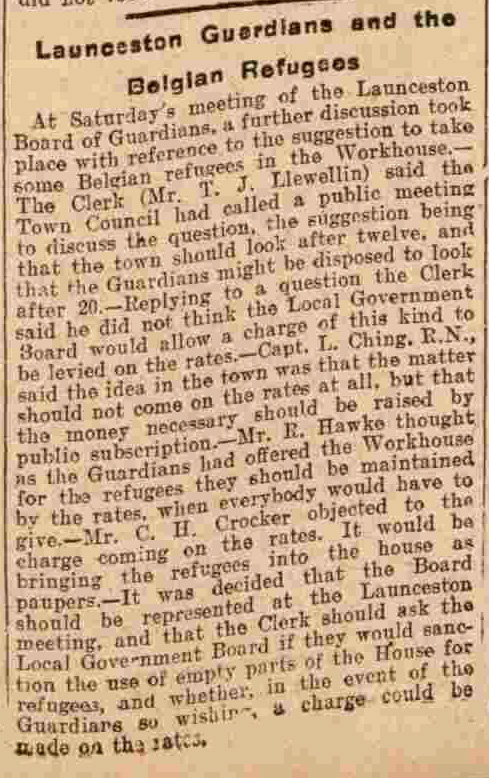
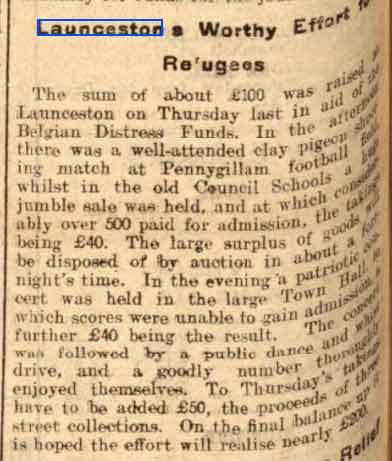
Cornish & Devon Post, 31 October, 1914: Launceston News: With the Canadian’s; Among the most recent arrivals from Canada are Ptes. Claude and Ernest Jones, sons of Mr Charles Henry Jones, of Tredydon, and formerly of Wooda. Both had been residing in Toronto and prior to the outbreak of war, were in the Volunteer Force there. Pte Charles Jones, whilst in Canada, was a member of the 9th Mississauga Horse; as soon as war broke out he volunteered for the Front, and arrived with the first batch of Canadians recently, having transferred to the Infantry. He had served five years in Toronto. He is in the printing trade and his employer has gladly consented to keep his job open. Pte Ernest Jones had been a Volunteer Territorial in the 10th Royal Grenadiers.
November
November 7th, 1914: Launcestonians, who have emigrated to other parts of the country, are doing their share in the great crisis. Mr Fred Stacey, son of Mr and Mrs J Stacey, The Walk, Launceston, has joined the Cornish Territorials. He was residing at Bude. Mr Stanley Jordan, son of Cpl. and Mrs Jordan of Race Hill, has undertaken the duty at Hastings of Special Constable.
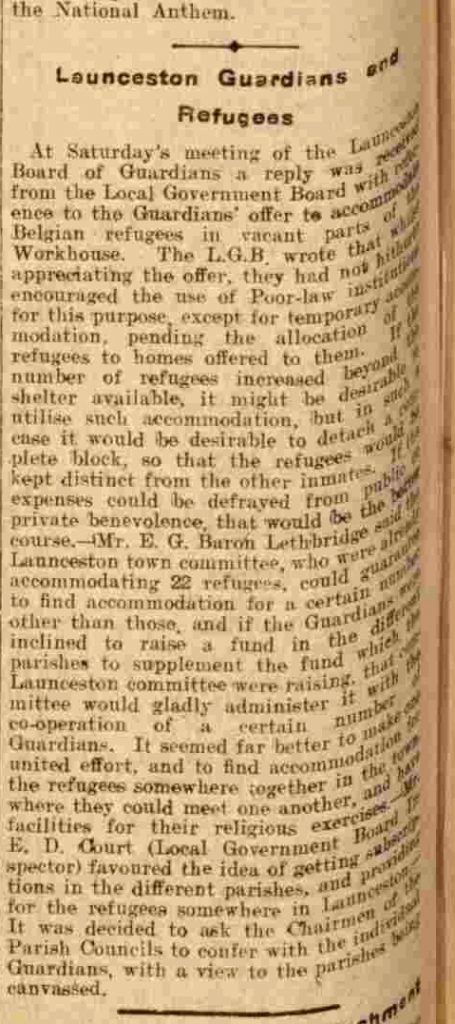
Launceston News: The convent has been sold to the Dominican Nuns, South Africa, who will shortly be taking possession, it is not known quite when. The Sisters at present in occupation are reduced to five, namely – Sisters Gabriel Moy (Mother Superior), John Berchmons, Elizabeth, Ambrose and Thomas Aquinas. Their services are wanted as soon as possible at Cherbourg, where their Order (Sisters of Charity of Jesus and Mary) have two houses, in one of which 100 orphans and 45 old women are cared for, and in the other 50 orphans. In this latter, which is a commodious building, 400 wounded soldiers are under treatment. The Order has 55 Sisters at Cherbourg.
Our Guests From Belgium: The Mayor (Alderman E Hicks) and the Mayoress (his wife), accompanied by Mrs Williams and Mrs T C Reed, have been to Exeter to choose from the distribution centre, which refugees would be cared for in Launceston. In all, twenty two were chosen and arrived by train on Friday. After many adventures, they are now at their journey’s end, and in their temporary houses.
Belgian refugees are now at Launceston, Bude, Port Isaac, Polzeath. Twenty-two were selected at Exeter by the Mayoress and Sister John Berchmons of St Joseph’s Convent, and Mrs T C Reed, who were brought by train on behalf of the Royal and Loyal Borough. Seven of the party that arrived early in the week, are being entertained at St Joseph’s Convent, namely: Madame Donnay, Madame Tengels, both from Antwerp, Mademoiselle Wauthor, Ostend, and a family named Pitois, consisting of a mother and four children – Philomel (16), Julia (14), Joseph (10), and Melanue (8). The father, a carpenter, died six years ago. This family witnessed some of the terrors of the attack on Malines. Mde Donnay left Antwerp at midnight, when the bombardment opened and walked for sixteen hours. She was going to take a train, but before she could do so, the train was struck by a shell, four being killed and several wounded. Among the refugees are an Antwerp policeman named Meuleman, and his wife and two daughters – Julia (16), and Bertha (11), who are staying at Mr and Mrs Cartwrights, the Ferns, St Stephens Hill.
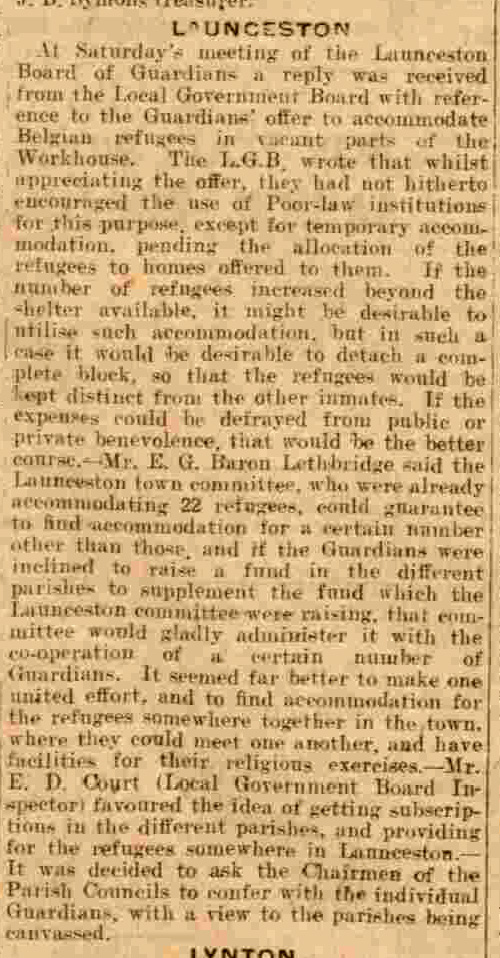
Vicar of Lawhitton reading a letter: 13 Nov 1914:– “On behalf of the 67 wounded soldiers, both British and Belgian, now in this hospital, I have great pleasure in sending their grateful thanks to the parishioners of Lawhitton for the most generous contributions sent for their benefit, consisting of 10 lbs of butter, 63 eggs, 7 fowls, a cake, and a good quantity of apples and pears, all of which have arrived safely this morning. In addition to this, I also thankfully acknowledge the receipt of £1. 2s. 10d, in money. : Sydney M Quannel, Secretary.
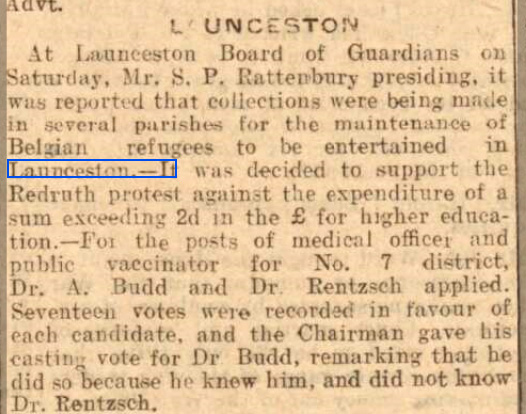
December
Post & News, December 5th, 1914: Launceston Shoeing-Smith. Home From The Front.
Invalided from the Army, shoeing-Smith Alfred Vosper, son of Mr and Mrs Vosper, of Northgate Street, Launceston, arrived home this week. He left home on October 12th, last, and after a little over a week at Woolwich, was sent across to France, being drafted to the 2nd. Div. 35th. Co. A.S.C.. Bailliud was reached by train, and later Poperinghe, where he slept in an engine shed, with about 70 others, on a bed of straw. The next morning they proceeded to Ypres, where the shoeing of horses was undertaken by day, and in the evening assistance was given to the men taking ammunition to the trenches, returning to their positions for sleep. Very often severe fighting would be in progress whist the ammunition waggons were being taken up, and on one occasion a shell struck a waggon behind Shoeing-Smith Vosper, knocking it all to pieces, killing the driver and a horse when it exploded. Two attempts were made by the Germans to break through whilst Mr Vosper was near the trenches. A number did actually get through, but they never returned to their lines – they were either killed or captured. One day the French marched through with 500 German prisoners. The scouting aeroplanes made pretty pictures as viewed from below, and the daring of the men was extraordinary, the scouting carried on whilst shells were bursting all around them.
The plight of the Belgian refugees was simply terrible, remarks Mr Vosper. Scores were to be met with every day, tramping from the battle area. On one occasion an old woman of about eighty was seen, being pushed along in a small cart by her son, who was himself grey-headed, whilst all their parcels and clothes were packed o the top of the old lady. The roads, which were like ploughed fields, were full of men, women and children with cycles, to which to which were attached their sole worldly belongings, tied in small parcels, their owners not knowing where to go. Babies were seen seated in small boxes on wheels used as a substitute for perambulators. In the 35th standing camp, many refugees passed their time, coming down at intervals when the kind-hearted soldiers saw that they did not want of food, going without themselves rather than the unfortunate people should be short. The weather has made a great change whilst Mr Vosper was there, turning from dry days and cold nights to heavy rain and snow and bitter nights. The Indians, who are doing such good work, appear to stand the weather well. A number of the soldiers were sent back to hospital, suffering from rheumatism. Mr Vosper was invalided back, and received his discharge early this week.
Launceston News: December 12th, 1914. Mr William Ough, formerly sergeant of the Band of the Royal Marine Light Infantry, bandmaster of the Devonport Detachment of the 2nd Volunteer 8th Devon Regiment, and for several years landlord of the London Inn, Church Street, Launceston, died at Stonehouse Royal Naval Hospital, Wednesday last. He met with an injury to a toe a few weeks ago, and his death is the result of complications following the injury. He leaves a son and two daughters. Mr Ough was Fifty-four years of age.
Post Card From The Front: Motor-Driver T Parson, A.S.C., at the Front, son of Mr and Mrs Marwood Parsons, Race Hill, Launceston, has sent an official post card to Mr AC Clewes, of Race Hill. From the card nearly everything is erased except “I am still quite well. I have not heard from you lately.” The card bears his signature and is stamped as being passed by the censor.
Home From The Front. Trooper Mason Recovering. Quite a number of persons were waiting last Friday to give Trooper RS Mason (who was wounded at the Front), a hearty welcome, when he arrived home at Little Athill, St Stephens. Trooper Mason, who is in the 2nd Life Guards, was driven to his house by Dr. FT Thompson. Although a little lame, Trooper Mason is in good health and spirits, and expects to go again to the Front on January 2nd next. All our readers will join us in wishing Trooper Mason a good recovery and a safe return when his duty is done.
December 12th edition: Letters From India. Baking For The Troops. Mr Charles Uren, son of Mr and Mrs William Uren, Southgate, Launceston, writing from Dunheved Cottage, Fowey, says it is very busy baking bread for the troops. Turning out about 200 loaves per night. It is expected to work up to 300 per night.
War Items: More than 200 men were killed or injured in the recent German troop train accident.
Pte F Nailor, of Sandhurst, Berkshire, was wounded at the front, and was at his home when the postman brought a letter the War Officer reporting that he was Killed in Action on November 1st. Nailor will return to his Regiment shortly.
LAUNCESTON NEWS: Mr Leslie Treleaven has been given a commission in the 3rd Battalion, DCLI; as a 2nd Lieutenant he will shortly be leaving for Falmouth.
2nd Lt. Humphrey Grylls, of the South Wales Borderers (son of Mr and Mrs CR Gerveys Grylls, Trenuth, Dunheved Road), who was wounded at the Front recently has now returned to his home.
Mr Frank Walters, son of Mr WH Walters, who has just left for India with a contingent of the 4th DCLI, has been promoted to the rank of Sergeant. The men, among several Launcestonians, has a good send off from Newquay. They sailed from Southhampton on Sunday last.
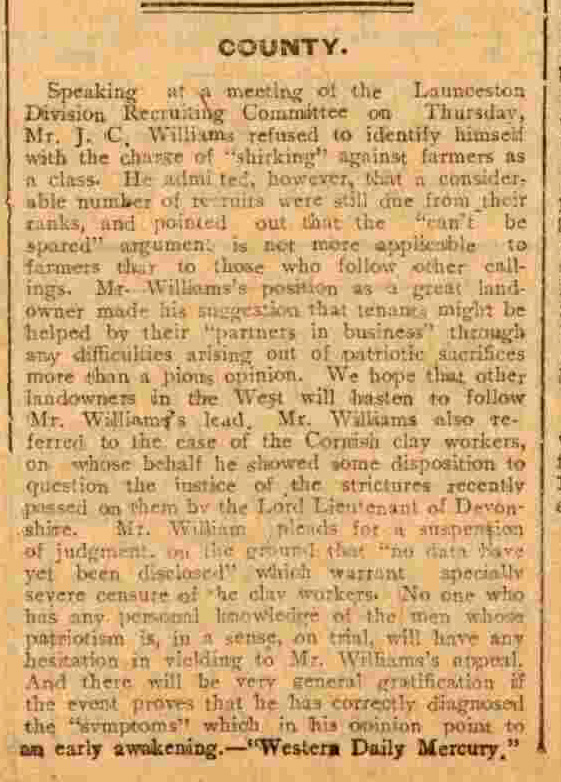
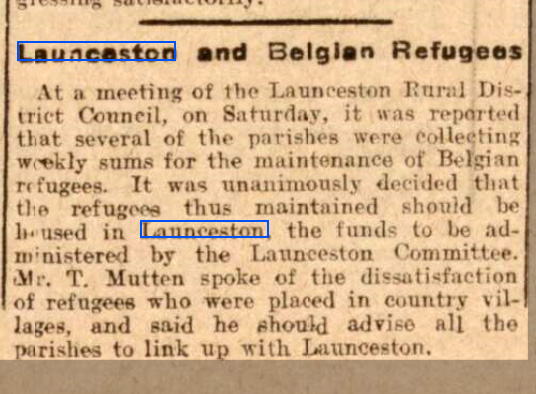
A letter has been received by Mr Ball, of Westgate Street, from Mr Will Veal, No. 34752, ASC, 8th. Field Bakery, 4th Base, Expeditionary Force, France. Mr Veal, who for some twelve months had been head man in Mr Ball’s bakery, enlisted in the Army Service Corps, September 11th, and was there and then called up for service, baker being in great demand. After a short time of training on Salisbury Plain, he was sent to the Front. About a month ago Mr Ball had a postcard from his former employee announcing that he was in France. Mr Veal’s father is a Launceston man, who has a tailoring business at Ottery St Mary. His grand-father will be remembered by not a few townsmen as a member of Launceston Volunteer Band. The letter, which is undated, but was received Wednesday morning, is as follows:-
“Dear Mr Ball – Just a few lines to let you know I have not forgotten Launceston. I was sorry to leave you as I did, but at the time I felt it my duty to enlist. I do not regret it. We have to rough it a bit out here, as we are under canvas; and last week we had some severe frost. Our water was frozen, so you could imagine how cold it is after being used to a feather bed. It is surprising what good bread is turned out from the field ovens, as everything is done in tents with a brazier under to keep the dough warm. I must thank you for taking the trouble to send my box and things home, as I know you must have been hard pressed for a time just then. Kindly remember me to your family and Mrs Ball. I am enjoying good health, which is a blessing, as a good many of our fellows are in hospital and some attending. I trust you are keeping well and business is steadily increasing. Last week I saw some chaps come down from the firing lines frost bitten. Two of them told me they had been in the trenches for three days. Their feet and hands were awful to look at.
I trust you are thinking about your Christmas cakes and things now. I don’t expect to make any myself this Christmas. Yours faithfully; Will Veal.”
Egloskerry & Tremaine: George Deacon is the first to be reported Killed in Action from an Egloskerry home. Extract of a letter to Mrs Deacon from a stretcher bearer of A. Co. 1st DCLI:-
We were all quiet in our trenches (at 2 pm. on December 5th) when two shots rang out, and I was called for, to find your son badly hit. I did my best for him but I am sorry to say that he was dead within five minutes from the time he was wounded. We buried George during the night, as it was not safe to do so during the day. You can rest assured that he was buried with a suitable honour for a soldier. We have placed a cross on his grave with a suitable inscription, with his name and regiment in print. Yours very sincerely, TE Bendle.
Mrs Martyn and Miss Dawe are anxious awaiting news of their brother, who is reported ‘Missing’ from HMS Goliath. The Admiralty announced that he is possibly a prisoner of war in the hands of the Germans.
1915
January
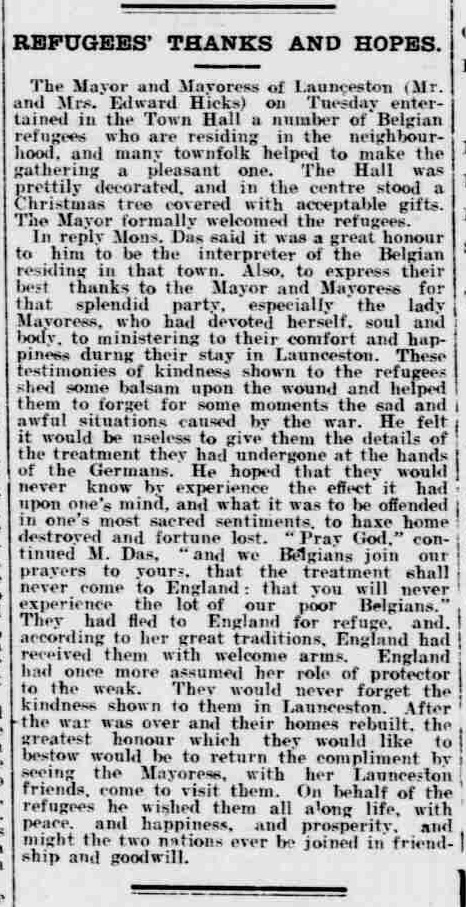
Trigg Major Magazine: January 1915: St M M : Vicar Rev-Canon FE Lewis, Hendra.
“RSPCA Fund For Sick & Wounded British Horses. In spite of the excellent arrangements and splendid work carried out by the Army Veterinary Corps for the care of the sick and wounded horses of the British forces of the front, the public has long felt a desire to co-operate in the humane and economic work of the Department. It is interesting here to mention that already some 23,000 horses have been into its hospitals, and tended with such care that large numbers have been returned fit to the front. The A.V.C., has already availed itself of assistance of the RSPCA by drafting large numbers of its Inspectors into the ranks of that Corps, and the Society has now received the official sanction of the Army Council to aid the cause in coping with the increased demand on its resources. This sanction is covered in the following words:- “that they will be grateful for your Society’s further assistance . . . . and approve of a fund being started by your Society for the purchase of Hospital requisites for sick and wounded horses.”
I have gladly accepted the position of chairman of a special Council to organise the fund, and I appeal with confidence to all for financial assistance to enable the RSPCA to assist in coping with this admirable work.
Cheques for the special fund may be sent to the Society RSPCA, 105, Jermyne Street, London, S.W., or to Mr CA Philimore, who has kindly consented to act as Hon. Tres., at Messrs. Coutts & Co. Bank, 440, Strand, London. Yours faithfully, Portland, Chair.”
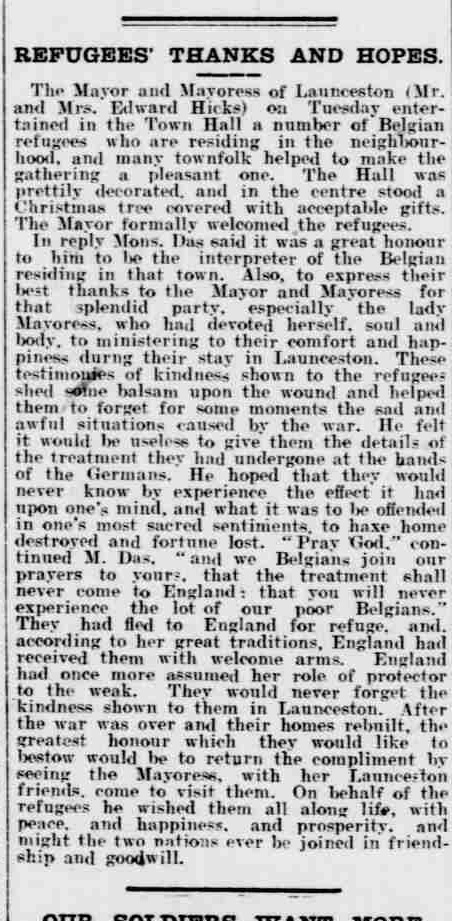
North Hill, January 1915: Note of the Month: North Hill has lost one of its most prominent sons in the sad death of Mr Claude Mitchell, from pneumonia.
North Hill: The sad death of Mr Claude Mitchell, who enlisted in the Territorial Forces four years ago, who has been engaged in trench digging on the East Coast, caught a very terrible cold and died of pneumonia in the Military Hospital at Newcastle.
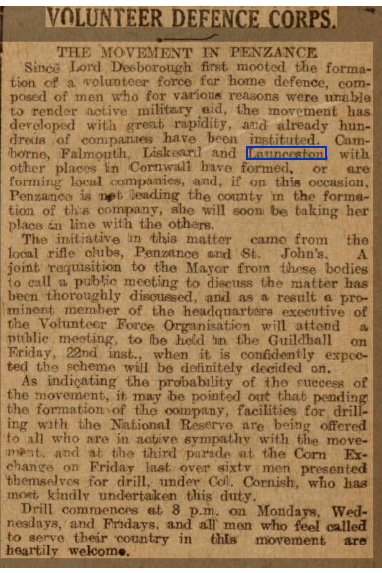
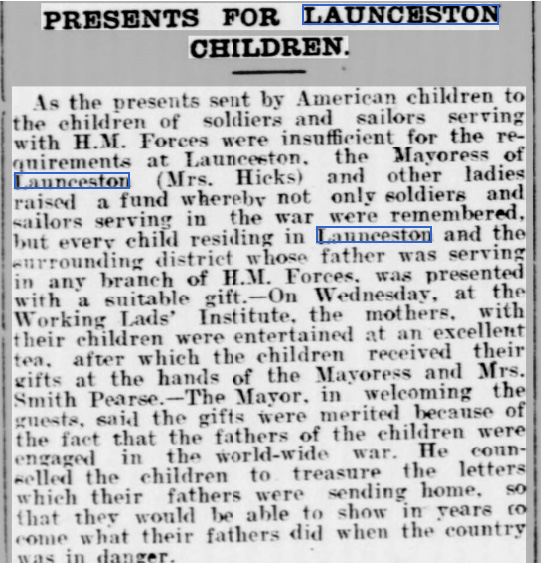


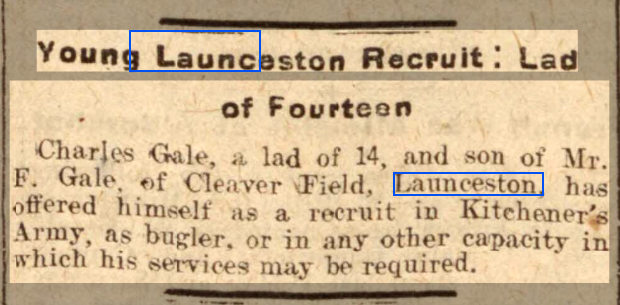
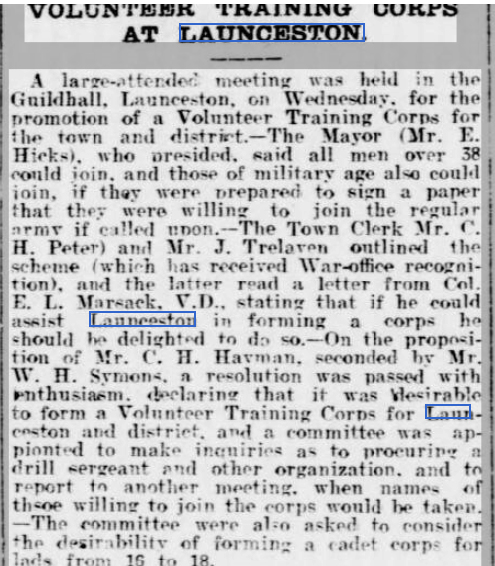
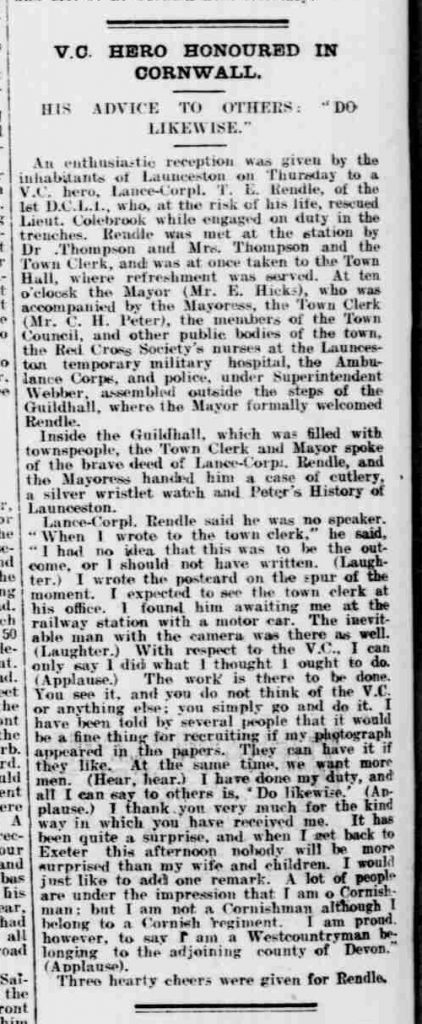

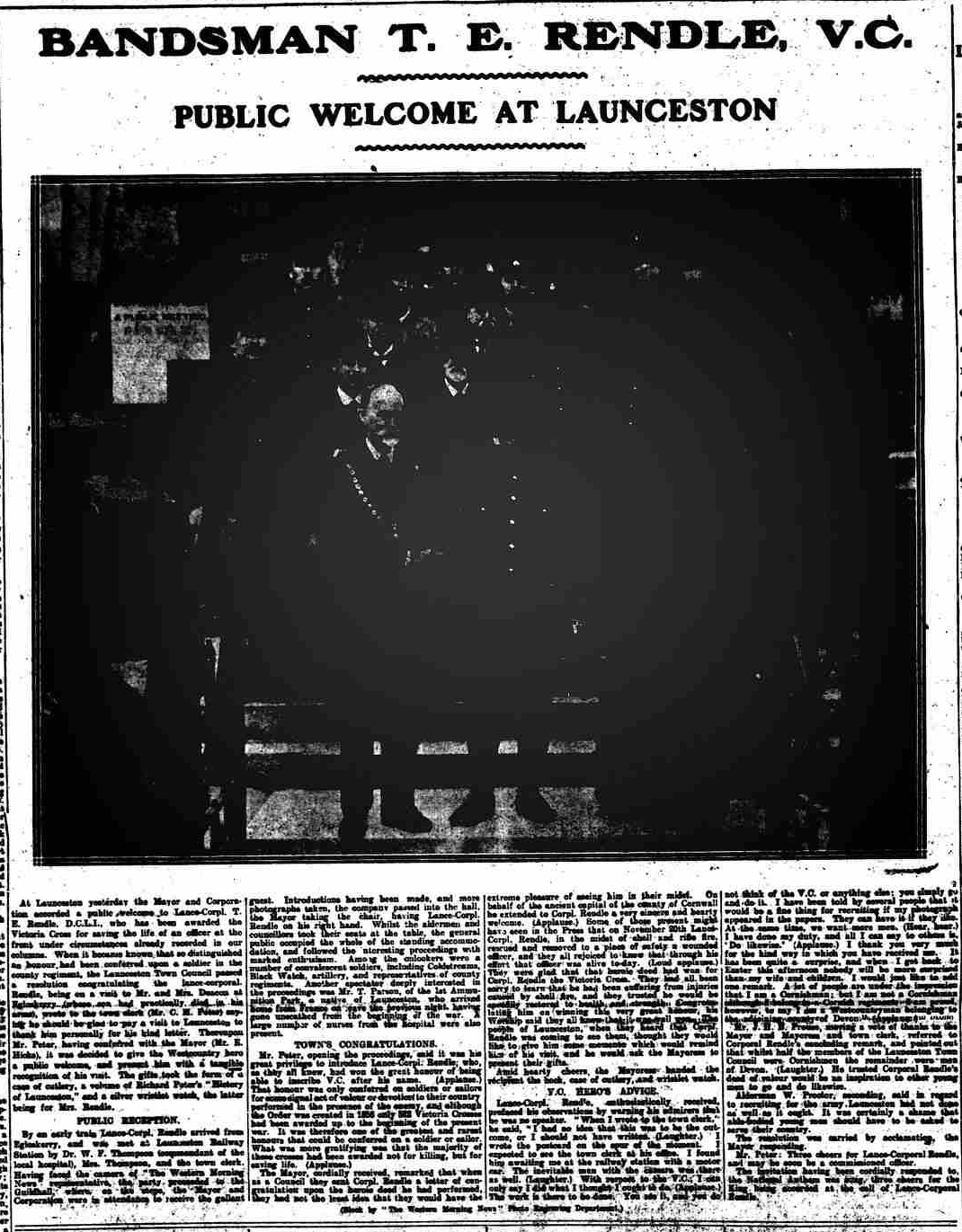

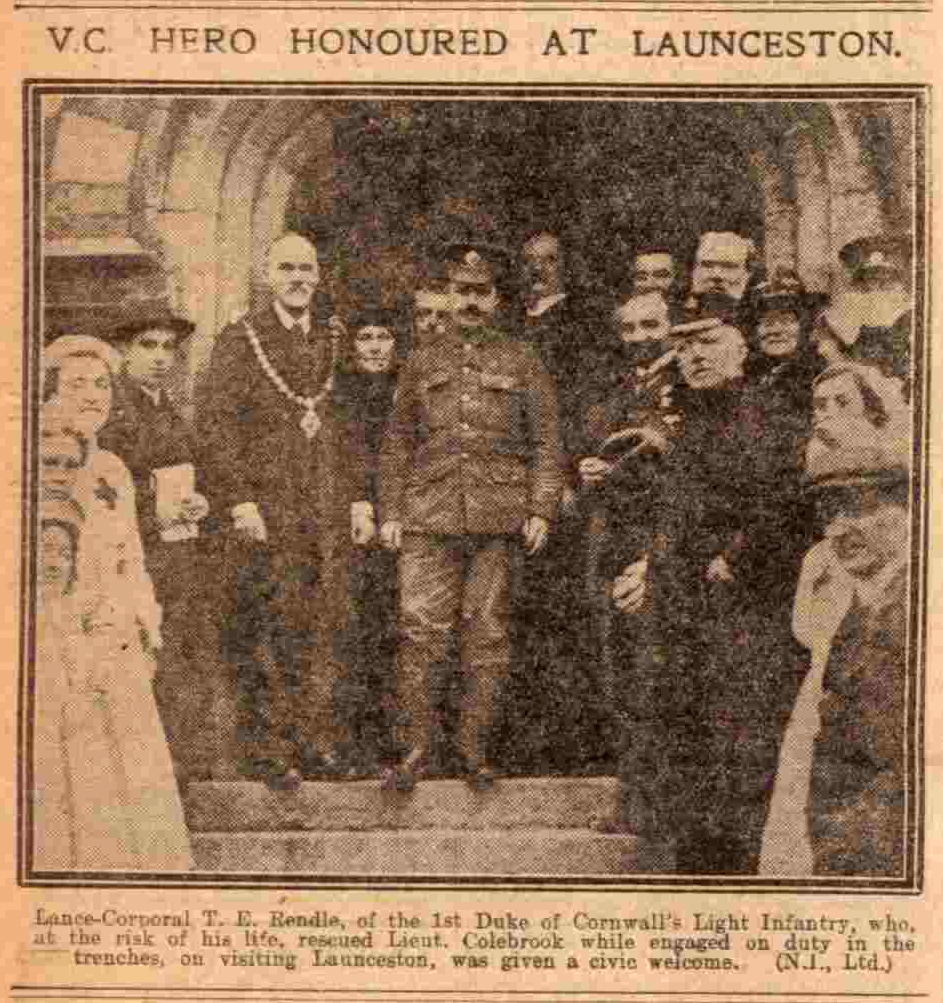
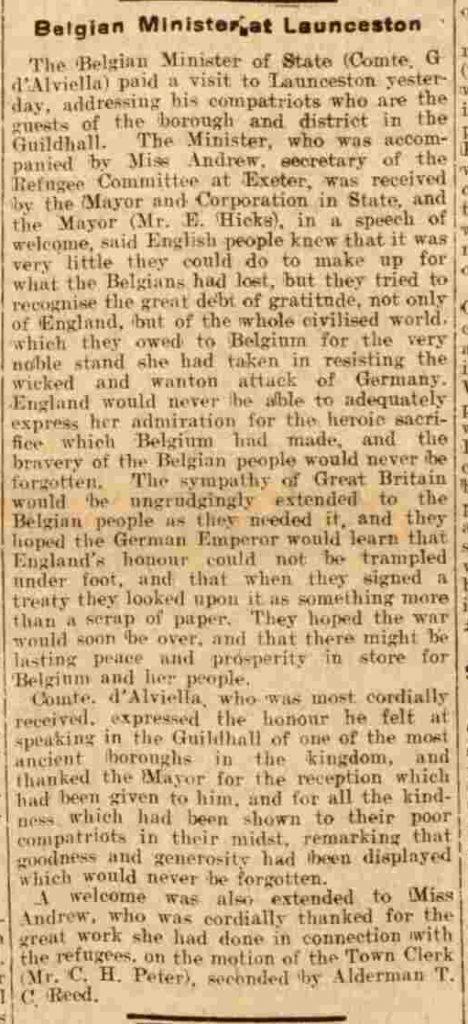

Broadwood: February 1915: Waiting for news of Frank Barnett, who is at the front.
Broadwood: L/Cpl Frank Burnett has laid down his life for his friends; his father and mother received the news from the War Office that Frank Died in Action on 18th Dec. He was in the Scots Guards. Our sympathy goes out to the father and mother of three sons in the Army – the youngest, Froude – is recovering from frost-bite.
PYWORTHY: Sgt. Instructor W Lethbridge, Sgt. H Gilbert; Ptes. JS Gliddon and AG Slade.
ASHWATER: L/Cpl. RA Mills; Ptes. W Tubb and A Turner.
North Petherwin: Corporal K Gubbin is at the Front.
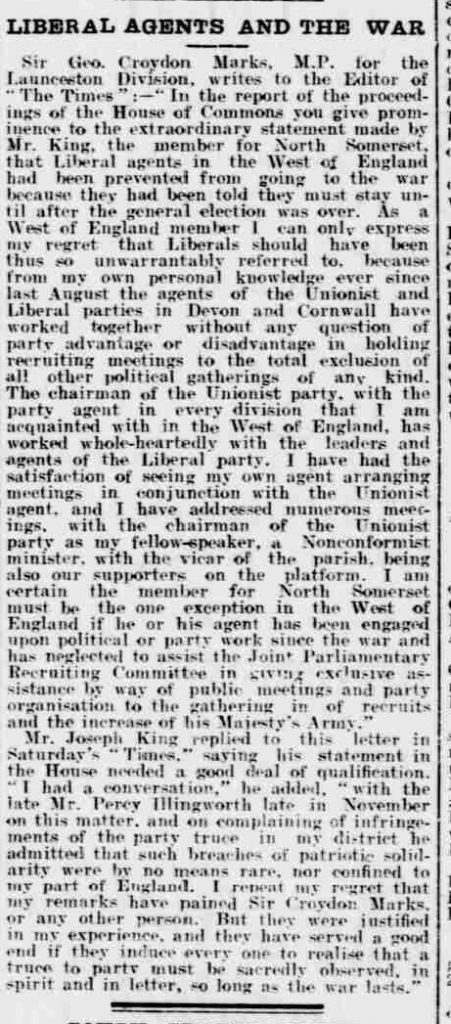

Marriage: February 16th, Pte Charles Samuel Causley [RAMC, 2nd Wessex] to Laura Jane Bartlett.
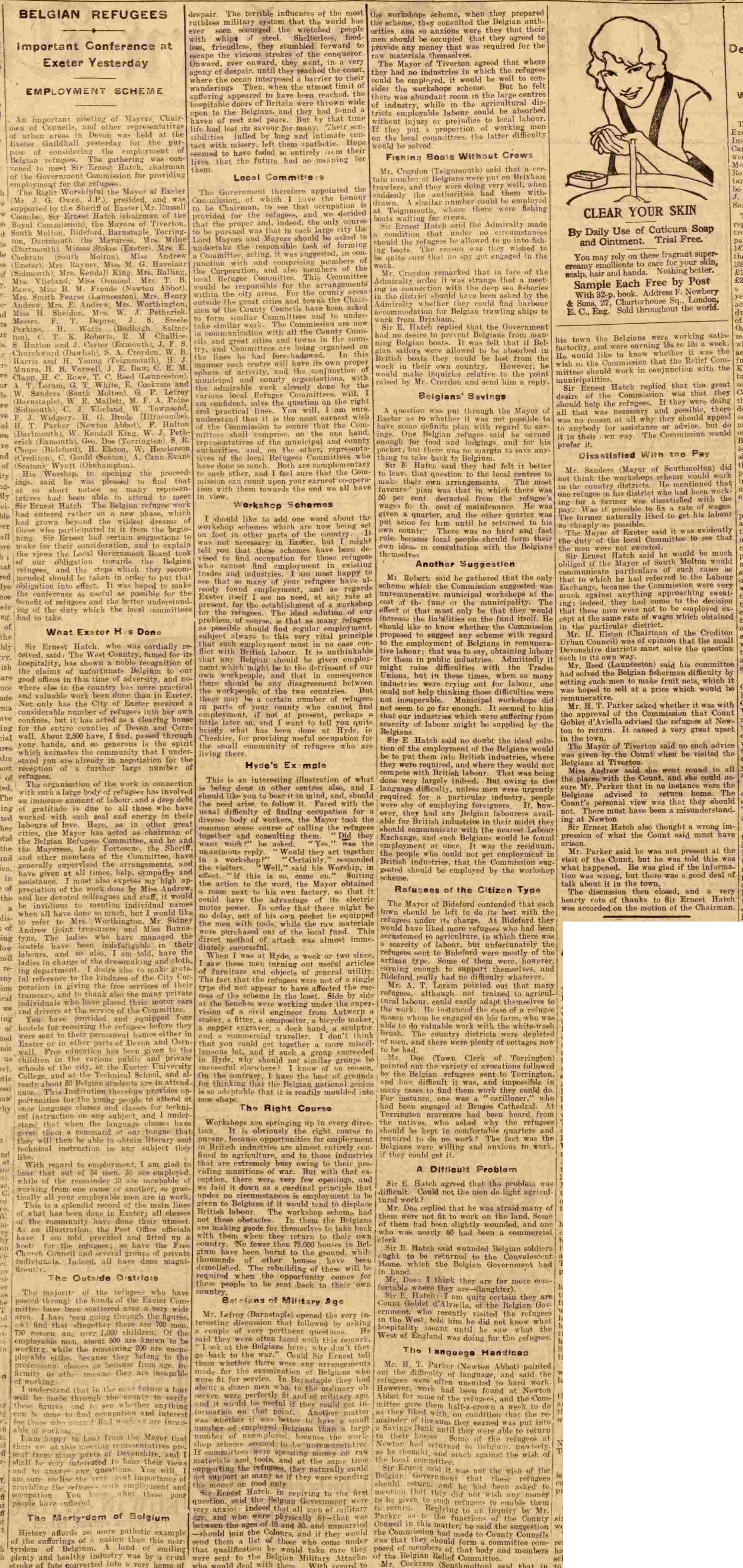

March

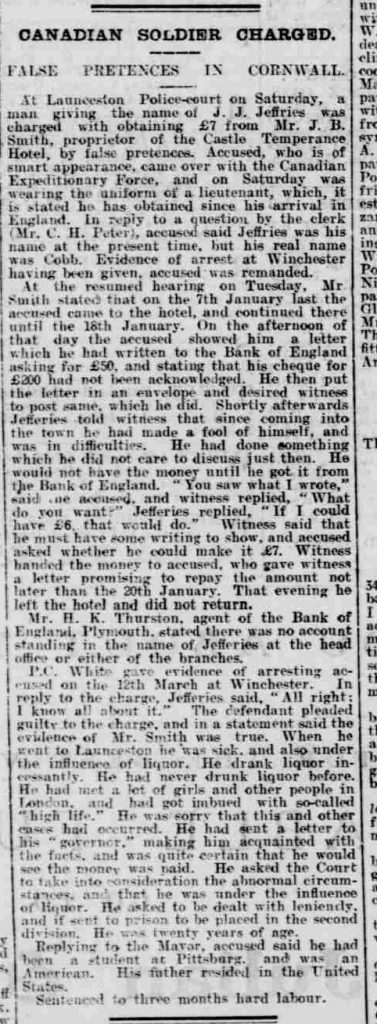
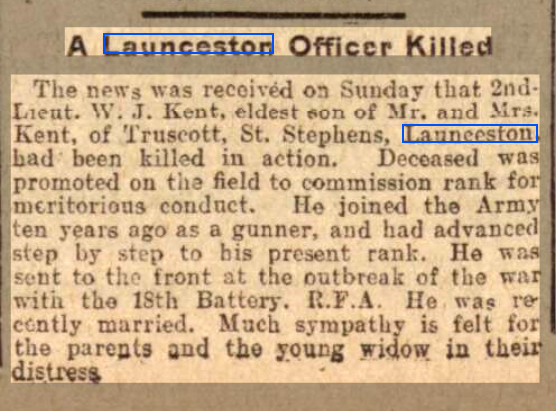
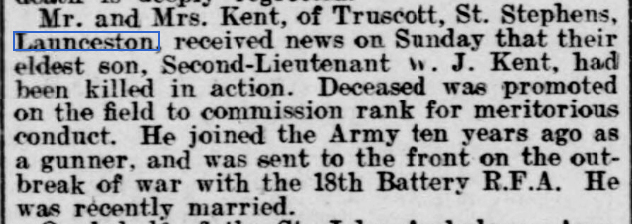

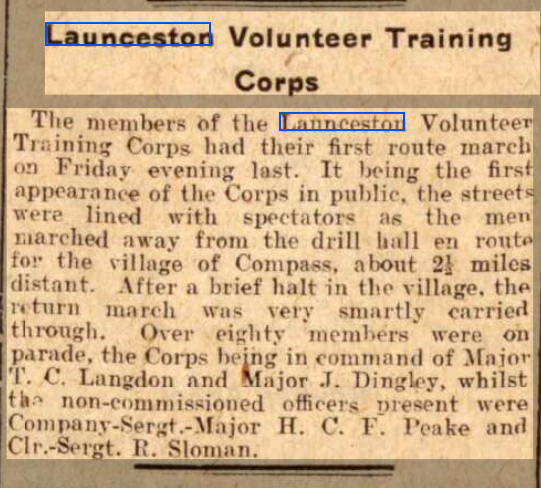
St Thomas, March 1915: Roll of Honour. One of the Rolls of Honour for the Parish of St Thomas, was placed in the Church at the close of Morning Prayers on Sunday 21st February. This interesting ceremony was performed by H Dymond, HMS Lion, and Pte JR Manning, 1st DCLI, after the reading of 72 names on the list.
News of servicemen: – we hear from H Dymond, HMS Lion, the thrilling story of the North Sea Fight.
We regret to hear that Cpl Olver, 2nd DCLI, is in hospital. He was one of the many sufferers from frost-bite, from which he is happily recovering.
Cpl Over is now laid up with fever, but making steady progress toward recovery.
April

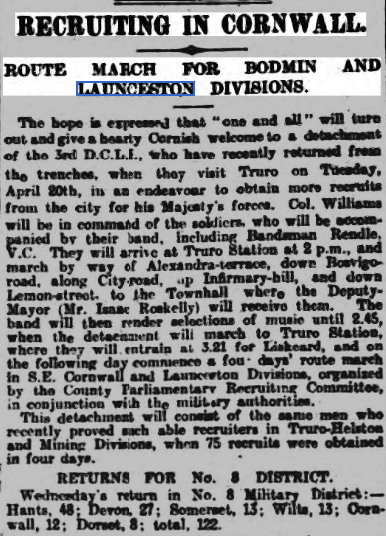

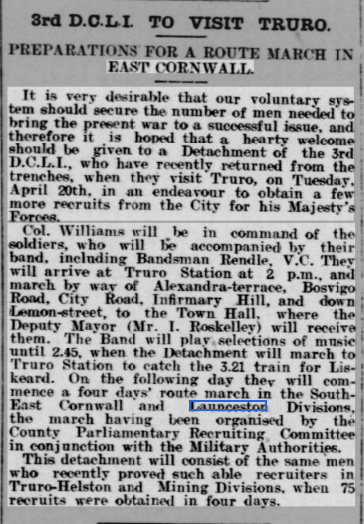
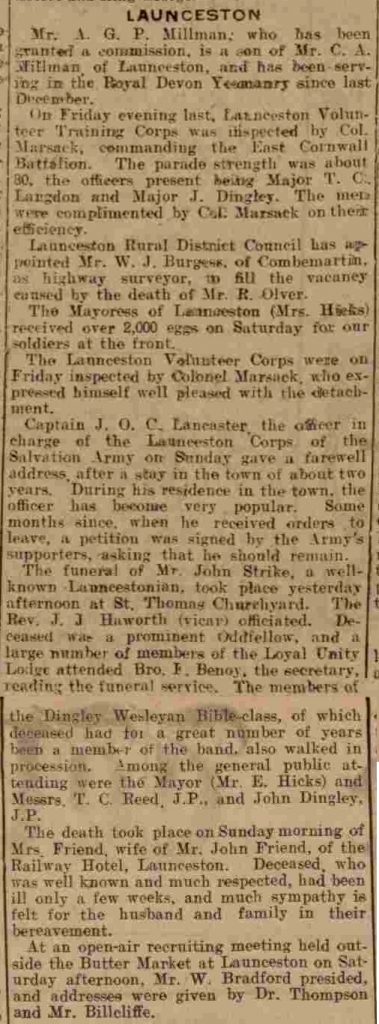
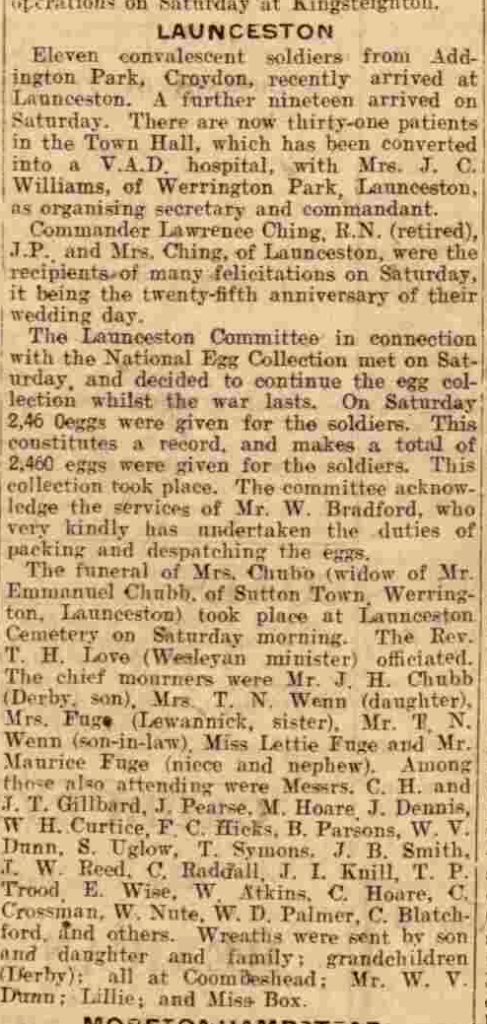
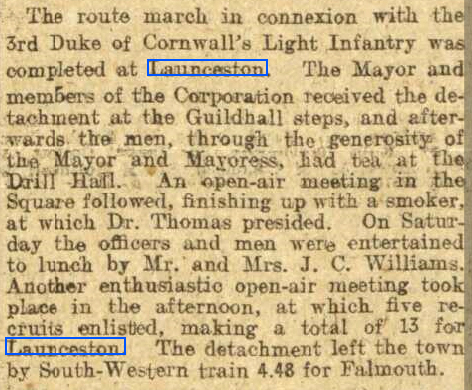



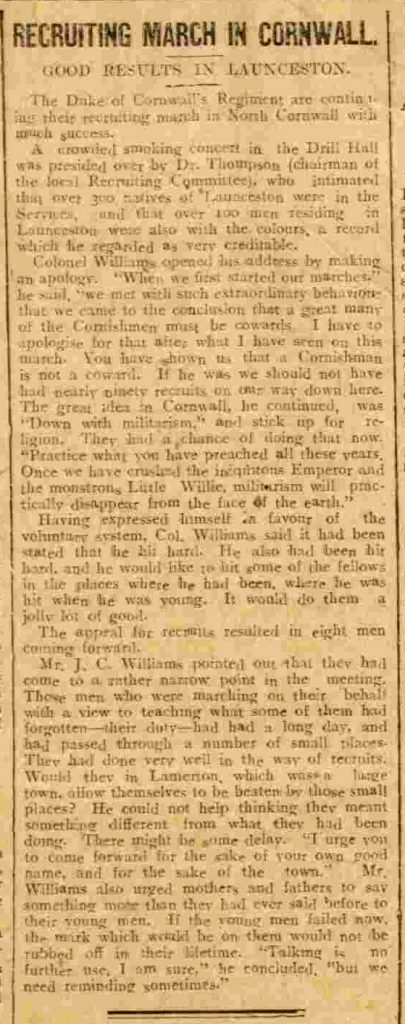

May


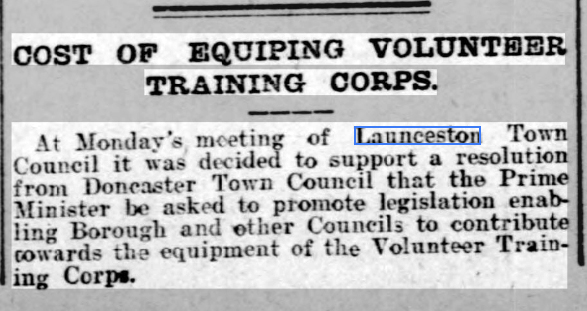
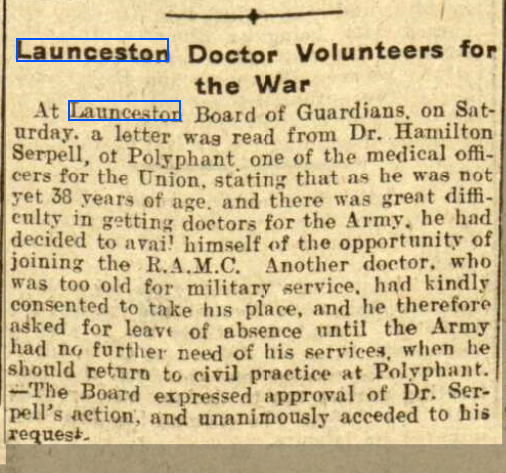

June
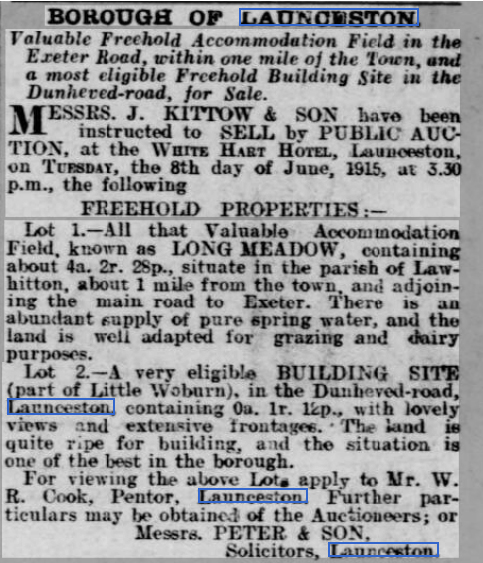
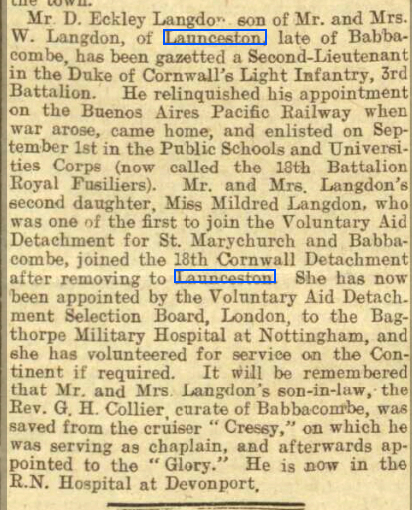
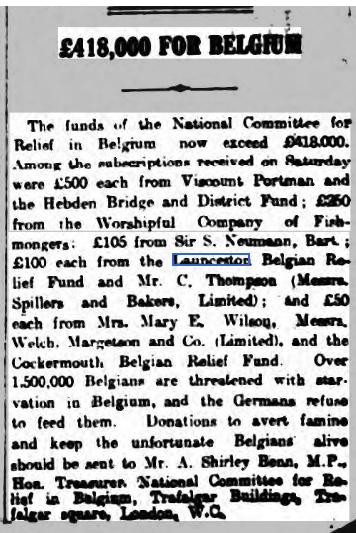

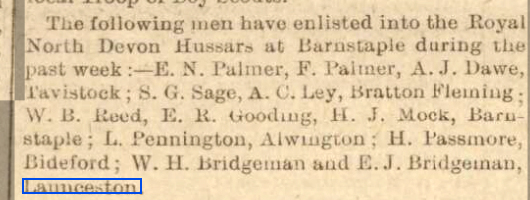

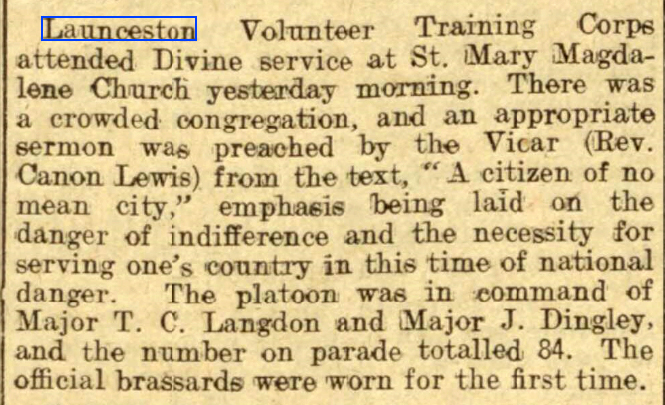
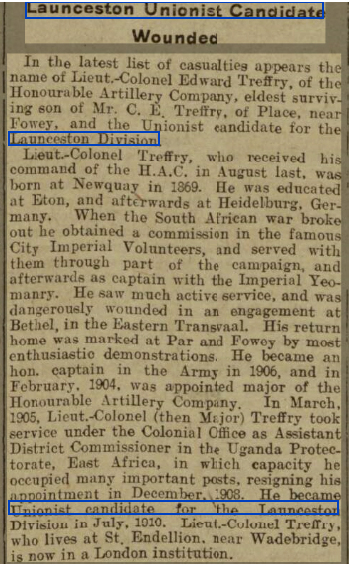

July
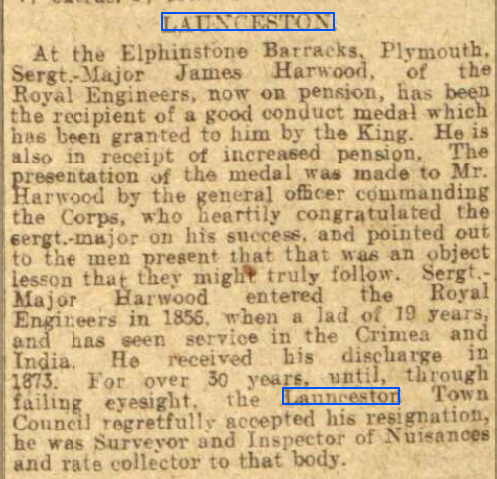
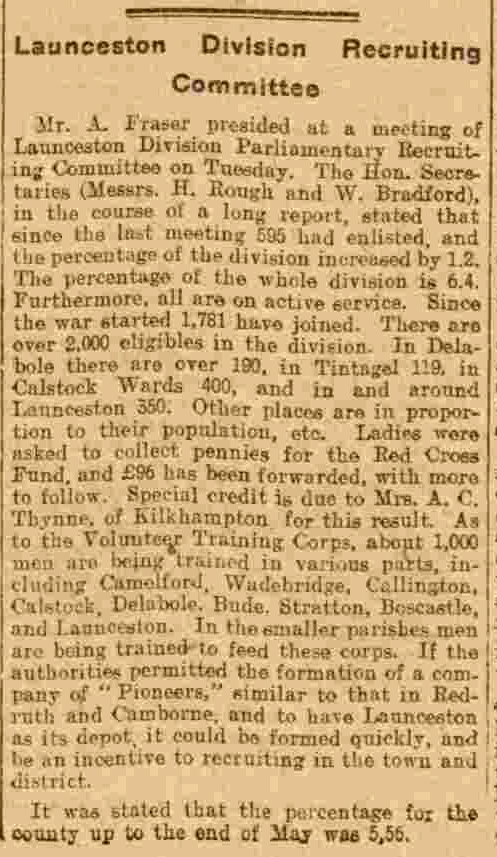

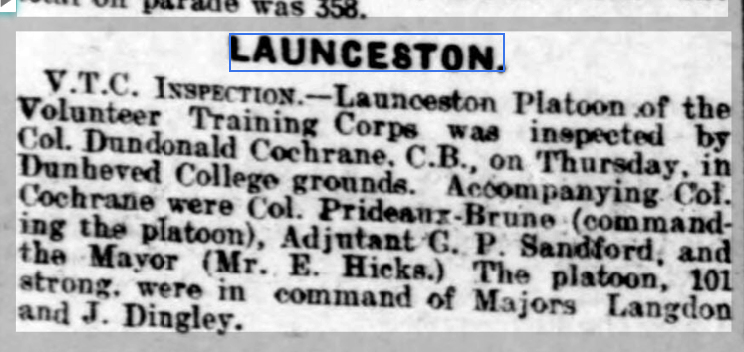


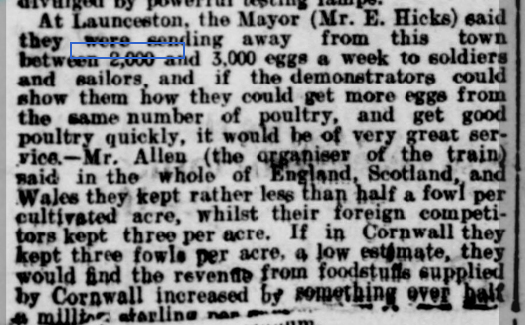

August



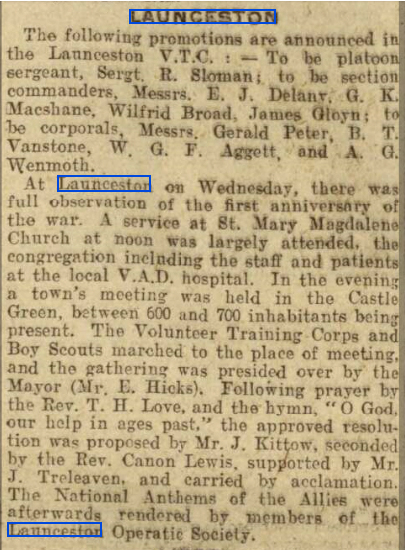



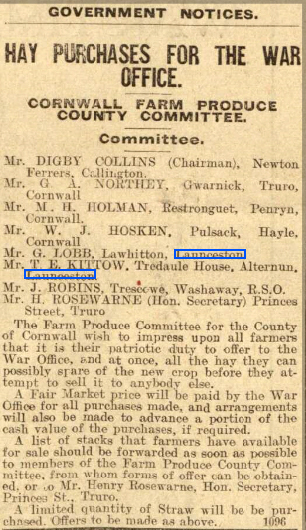
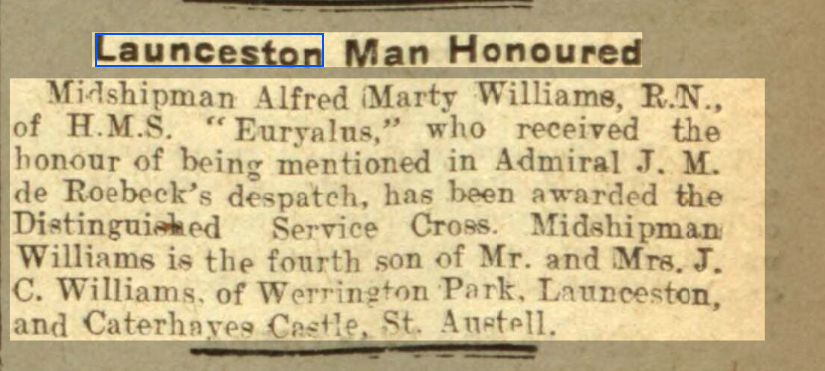

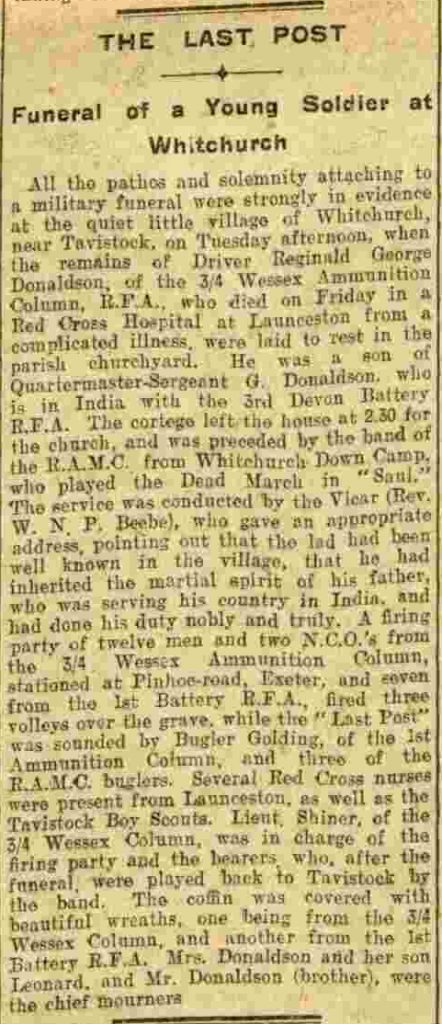
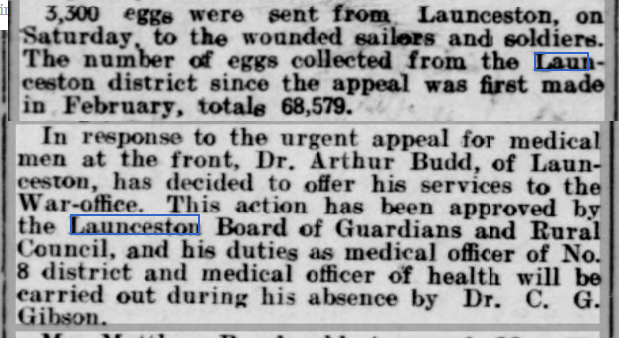
September
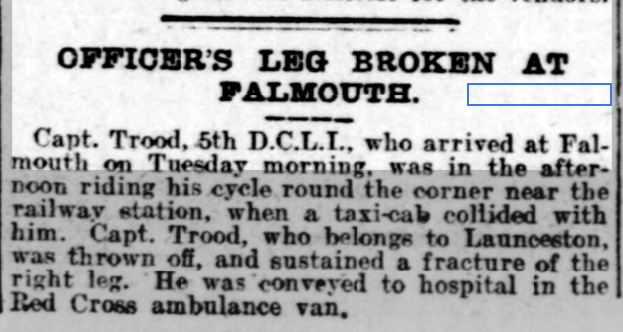
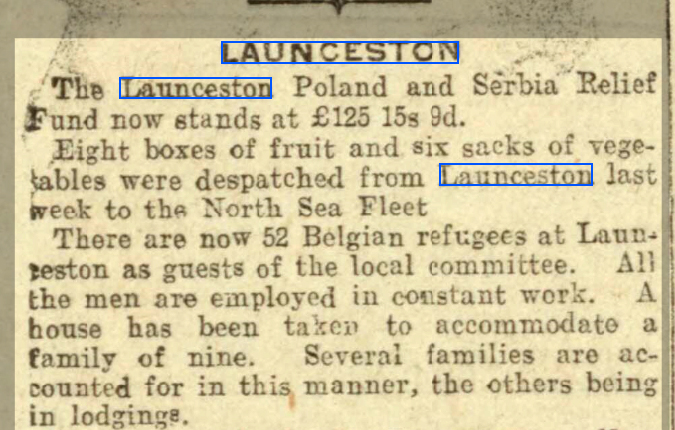



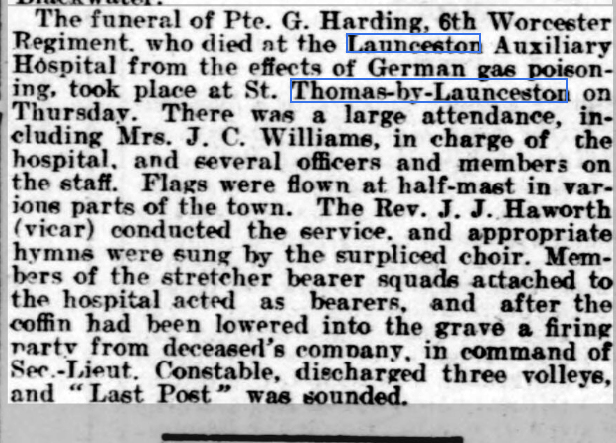
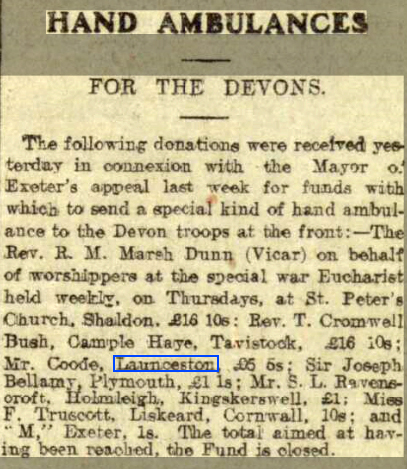
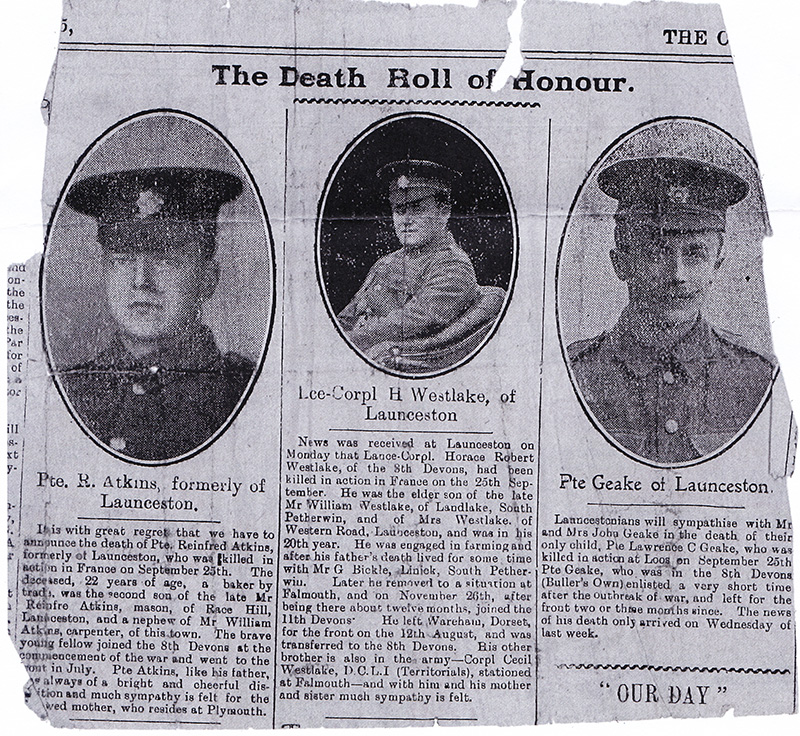
October
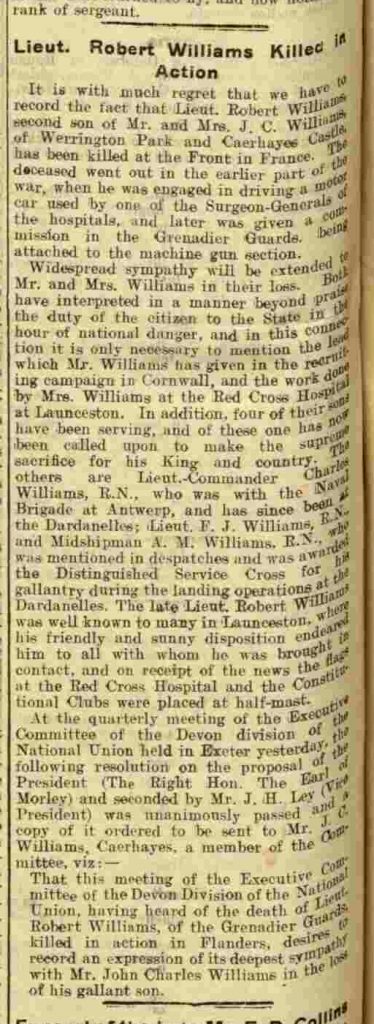



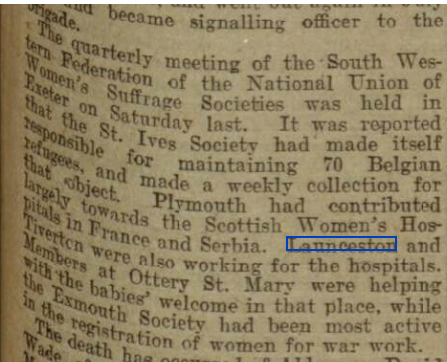

November
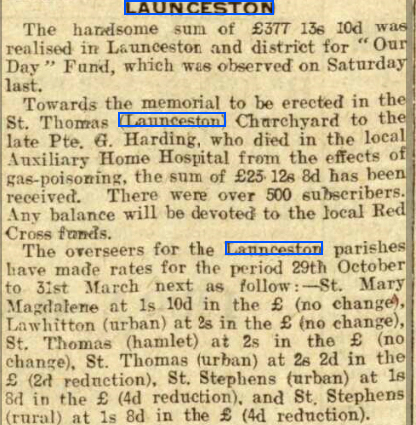

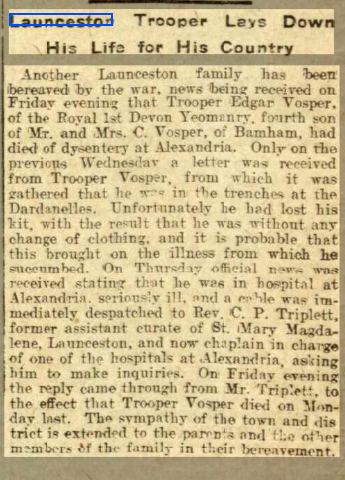
Trigg Major Magazine, November 1915: St Stephens – Rector – Ernest Drew: News has come through to us on Thursday, October 14th of the death of Lt. Robert Williams, Grenadier Guards, the second son of Mr and Mrs JC Williams of Werrington.
News has reached me that Lawrence Ching Geake has been very seriously wounded – for several weeks he has been missing – the news that has reached his parents is unauthorised, but we will hope an pray or the best.
S Thomas: Nov 1915. Letters received from Sapper PT Widdicombe, Cpl. H Hicks, L/Cpl W Turner. GN Carter and AH Wood have obtained commissions.
Pte G Harding Fund set up.
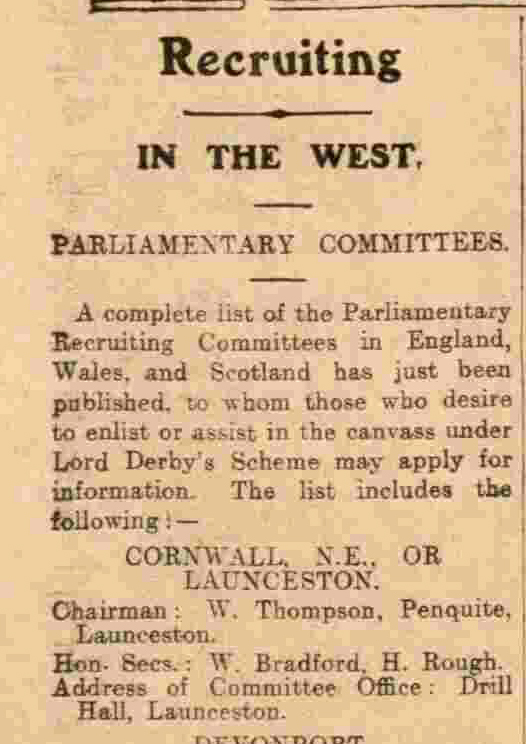
December
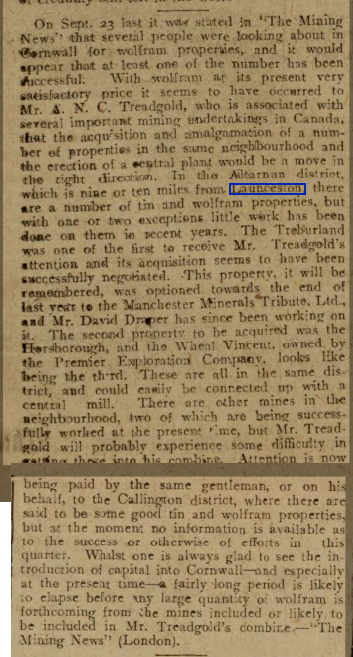
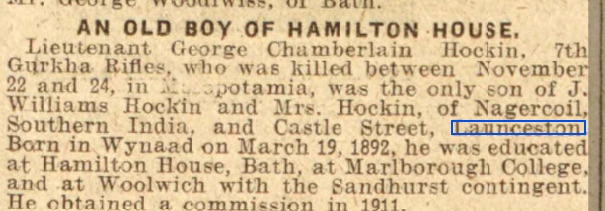
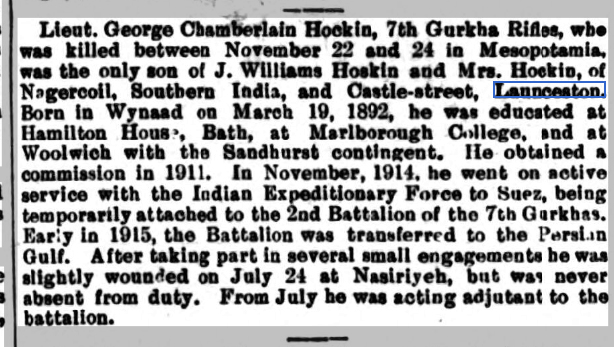

St Thomas, December 1915: It is a pleasure to welcome Bombardier HJ Batten and Driver T Smith on a well earned furlough after more than a year’s service at the Front.
Returning to duty: L.Cpl J Manning, promoted in Flanders. Stoker FJ Maunder. Seaman Northcott looked little the worse for his adventure with the ill-fated HMS Argyle.
A sad Memorial Service was held on November 14th. in memory of L/Cpl HR Westlake and Pte. CHR Buchan. Young Westlake was in the 8th Devons and was killed September 25th. at Hulluck, in the last great attack on the German trenches. Pte Buchan volunteered in India to go to the Persian Gulf Expeditionary Force, and was Killed in Action on the way to Baghdad.
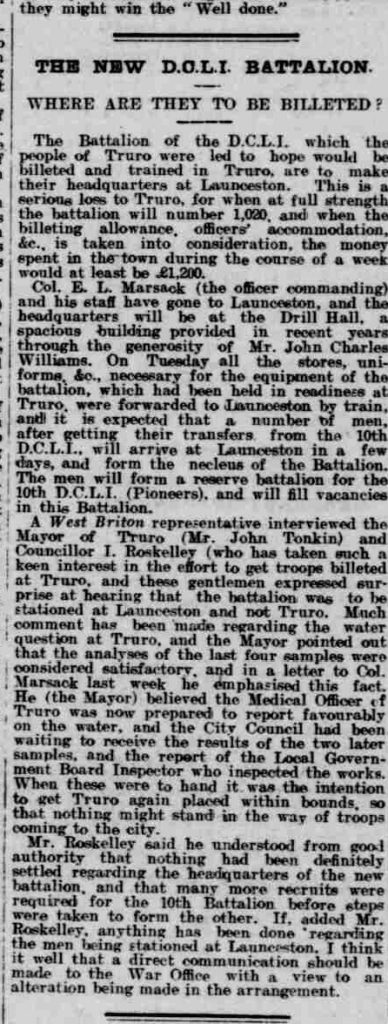

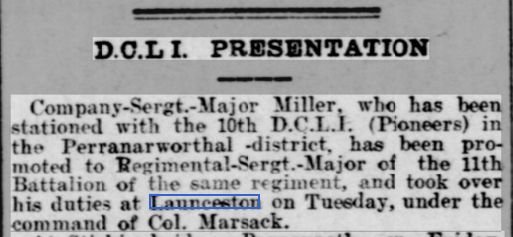

Launceston through the First World War 1916
Visits: 115

